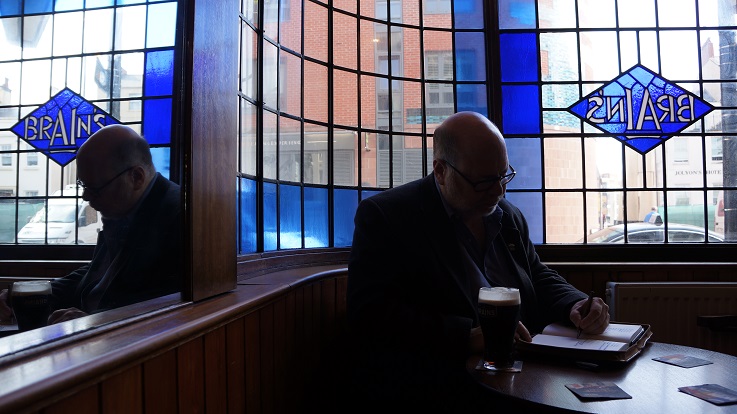 |
In the Autumn of 1969, I began a first semester at Bucks County Community College in southeastern Pennsylvania. I was a Liberal Arts/Humanities major. Early on, we were given an assignment to compose an essay about ourselves, or something like that. It was over fifty years ago and I donít remember perfectly. The assignment was only supposed to be a page or two, but mine ran to six or more, and was illustrated. It concluded with a quote from J.R.R. Tolkienís The Return of the King. This time, I will begin with the quote.
In the story, the situation has become exceedingly bleak for Frodo and his devoted friend, Samwise Gamgee. Middle-earth is succumbing to malefic Sauron. When all hope felt lost for them, and for me the reader, there was this passage:
| There, peeping among the cloud-wrack above a dark tor high up in the mountains, Sam saw a white star twinkle for a while. The beauty of it smote his heart, as he looked up out of the forsaken land, and hope returned to him. For like a shaft, clear and cold, the thought pierced him that in the end the Shadow was only a small and passing thing: there was light and high beauty for ever beyond its reach. |
I continue to find hope in the night. Seeing the stars is a bewildering beauty. What tiny fraction I can understand of astronomy and physics informs me that what I am seeing are distant suns of an ancient past. I know from science they are not pinholes in a black velvet cape or a heavenly host of angels doing - exactly what? - inside the dome of a glass firmament that holds back the cosmic sea. Why should remote balls of fusion in an inhospitable universe inspire me and the Hobbit Sam with hope?
Because it feels like a blessing. My limited education and resulting understanding has granted me the phenomenal joy of being conscious of such things as space and time, understanding it better than my ancestors. It is also better than many of my new friends here in Cardiff. When looking at a crescent moon hanging above the western horizon shortly after sunset, they could not tell me if it was waxing or waning. Nor did they care. They do not know a half moon and a quarter moon are the same thing.
Contemplating the sky at night led to an appreciation of this fragile existence and our short moment of awareness. I am grateful for this knowledge because it has inspired me and helped me to determine my priorities.
I do not share the selfish lust of oafish corporations ignoring climate change. Nor do I have the brutish conceit for power that drives the infamous Putin to invade Ukraine. The hostile universe in its unimaginable vastness has consented to overlook, for the time being, our astonishingly slim environment. I do not fear not being special. I do not fear not being important. Given the size of space and the length of time, I am inconsequential. I am grateful for being spared and allowed to fill my senses with experiences. It is a mystery to me why I find certain things beautiful, but I do. It feeds an insatiable curiosity. Something deep inside, in my bones, is glad for music, glad for a womanís affection, glad for stories, glad for loyal dogs, and glad for the night sky.
What I fear is not being myself and not being able to improve myself. It is enough if being myself merits being loved or liked or respected. I have no desire for divinity, no need to belong to that elite heaven-bound class halfway between ape and angel. It is enough to have friends. Friends keep me alive. We have arrived to a second quote, from the esteemed Carl Sagan. It appears in his novel Contact, ďShe had studied the universe all her life, but had overlooked its clearest message: For small creatures such as we the vastness is bearable only through love.Ē
Addendum:
While writing this essay, I searched the internet for the two quotes I intended to use. I had them in my notes, and I am pleased to report I had them letter-perfect, but I needed to be sure before they were submitted for publication. It was while searching for Carl Saganís quote, that I discovered there was a book with the title, For Small Creatures Such As We: Rituals for Finding Meaning in Our Unlikely World. The book came out in 2019.
The book is by Carl Saganís daughter, Sasha Sagan. I ordered the book. After I had finished the essay, I began reading the book. In her introduction, Sasha Sagan writes,
| My parents taught me that the universe is enormous and we humans are tiny beings who get to live on an out-of-the-way planet for the blink of an eye. And they taught me that, as they once wrote, Ďfor small creatures such as we, the vastness is bearable only through love. |
![]()
Mr Bentzman will continue to report here regularly about
the events and concerns of his life. If you've any
comments or suggestions, he would be pleased to hear from you.
You can find his
several books at www.Bentzman.com.
Enshrined
Inside Me, his second collection of
essays, is now available to purchase.
